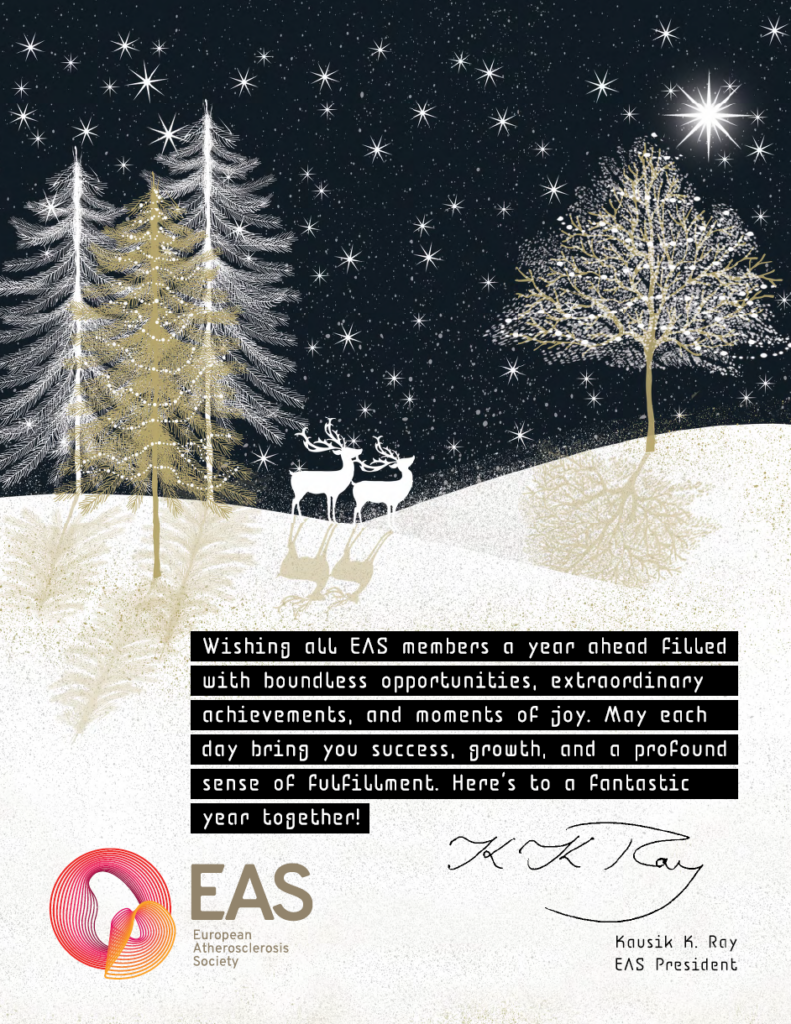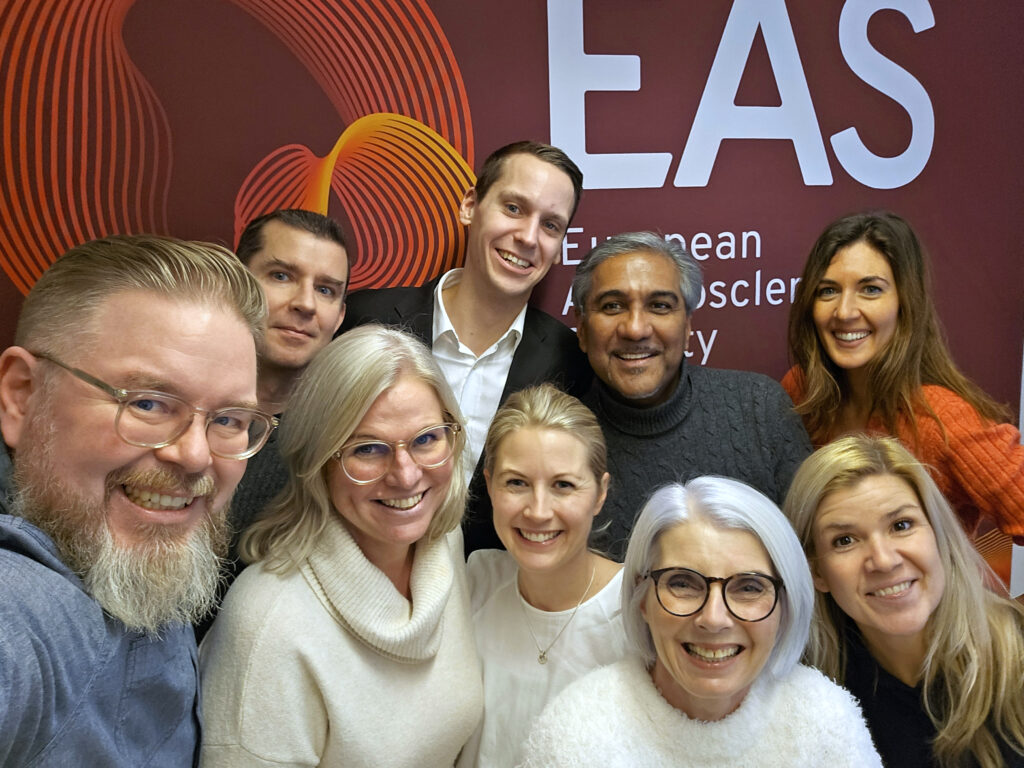Review of the year 2023, by EAS President, Prof Kausik Ray

As we approach the end of 2023, it’s a moment for us as a Society to reflect on our achievements and anticipate the challenges and opportunities that the next year may bring. My thoughts inevitably turn to the EAS Elections held in June, during which Prof Borge Nordestgaard was chosen as President-Elect and Prof Evangelos Liberopoulos as Ordinary Member. The unprecedented representation of 980 members who voted from 69 countries is a testament to the fact that we are a truly global society with engaged active members. This was for me inspiring to see, so thank you for the time and effort to participate.
Our next President will need a strong and hard working team. The Society is only as good as those driving its initiatives and activities. Elections for VP, Secretary, Treasurer and three ordinary members will take place next year. That process starts with nominations from January 2024 for potential candidates. That’s your opportunity to continue and build upon the good work of this current EC.
Everyone passionate about atherosclerosis, regardless of their role in clinical work, research, industry, or media, is encouraged to be part of our society. We value diversity, and each one of you can contribute equally to the success of the EAS. In response to the fast-paced environment that characterizes our world, we are introducing modifications to our membership application process, effective from January 1, 2024. This adjustment is aimed at ensuring the integrity of the EAS community by aligning with the highest standards of scientific credibility.
We extend a warm welcome to new members and national societies. In the year 2023, EAS continued to strengthen its global outreach through joint sessions with European National Societies and actively collaborated on educational initiatives with national societies in Latin America and Africa, and we have intentions to broaden these partnerships to include Asia-Pacific and Europe in 2024. Currently, our active collaborations extend to 32 national societies worldwide.
The heartbeat of the EAS community and the highlight of our year is our annual EAS Congress where our members convene over 4 days. This year, with 1,639 delegates onsite in Mannheim from all corners of the world (and many more attending virtually), this year’s face-to-face meeting created a wonderful atmosphere for forging new friendships, gaining fresh ideas, and finding inspiration to elevate studies on atherosclerosis and related vascular diseases to new heights. Many thanks to all whose contributions made the congress a tremendous success, but with special mention to Congress Chairs, Ulrich Laufs & Winfried März and Scientific Programme Committee chair, Christoph Binder. We have raised the standard, and our commitment is unwavering as we aim not only to exceed these accomplishments but also to establish new records in Lyon. We welcome you to be a part of that vision in your society.
Outstanding publications have been and will consistently remain integral to our international reputation recognition. In May we published an Update of the European Atherosclerosis Society Consensus Statement on Homozygous Familial Hypercholesterolaemia: new treatments and clinical guidance that present recommendations fundamental to improving HoFH care in all regions of the world. There is still much to do to improve the care of patients with HoFH, in whom delayed diagnosis and undertreatment are the norm in most countries. Our 2023 update has thrown down the gauntlet, providing pragmatic clinical guidance to drive better care and improve outcome and quality of life for HoFH patients globally. The challenge will be delivery, with new thinking needed on how best to implement best HoFH care for patients. Thanks for raising awareness to the Co-chairs of this panel: Robert A. Hegele, Frederick J. Raal and Marina Cuchel.
In August our call to action on “Women, lipids, and atherosclerotic cardiovascular disease” was published. Cardiovascular health of women is often neglected, with risk underappreciated, diagnosis delayed and treatment less than optimal. This new statement recommends targeted action to reduce the burden of heart disease, stroke and peripheral arterial disease in women. A key focus of the statement was how changes in lipids over the life course impact cardiovascular disease in women. I express our gratitude to the entire group involved: Roeters van Lennep JE, Tokgözoğlu LS, Badimon L, Dumanski SM, Gulati M, Hess CN, Holven KB, Kavousi M, Kayıkçıoğlu M, Lutgens E, Michos ED, Prescott E, Stock JK, Tybjaerg-Hansen A, Wermer MJH, Benn M.
Finally in December the EAS FHSC published the largest ever study of Familial Hypercholesterolaemia in a paediatric population in the Lancet, which strongly makes the case for screening in childhood. These findings have been instrumental in providing data which allowed our partners in the FH Europe Foundation to make the case at EU level for the Prague Declaration advocating universal screening of lipids in childhood.
We have been continuing our efforts and supporting additional and new activities during the year supported by a strong business model and financial base. These include:
– The development of young researchers within the EAS community by issuing EAS Competitive grants. This initiative is designed to empower talented young scientists, enabling them to pursue and advance their careers in the realm of atherosclerosis.
– The EAS Young Fellows programme stands as the flagship educational and networking initiative for younger early career members of our Society. In the upcoming year, a new cohort will have the chance to join this program, and nominations are set to open in January 2024.
– Our update to the Clinician’s Handbook was introduced to follow up the 2019 Guidelines and to discuss how to apply guidance in modern clinical practice incorporating developments in novel therapies and science. This year, EAS successfully organized 5 webinars dedicated to addressing Rare Lipid Disorders as part of its educational initiatives.
– The Certificate of Lipidology online module for nurses is about to be released, in recognition of the need to provide relevant knowledge to a broader healthcare professional community increasingly involved in prevention of atherosclerosis.
– EAS sustained support for the European Lipoprotein Club and their 46th scientific meeting, a vital platform fostering collaboration and knowledge exchange among scientists focused on lipoprotein metabolism. The successful event drew 108 participants, with a majority of young investigators engaging in presentations and networking with senior scientists over three days.
– The EAS Lipid Clinic Network program, has rapidly grown in the last two years, reaching over 500 clinics in 59 countries. Our goals include geographic expansion, platform development for data collection, and the creation of new programs addressing barriers to optimal patient care. The Lipid Clinic Network is an ideal channel for delivering educational activities to specific target audiences and interest groups, supporting the implementation of clinical practice guidelines for lipid disorders and cardiovascular disease management globally.
– Since our 2021 position paper, EAS has prioritized sustainability, aligning with the ‘Good Health and Well-Being’ goal of the Sustainable Development 2030 Agenda. Like other academic societies we continue to find ways to reduce our carbon footprint.
– To help promote better cardiovascular health for European citizens, we became a partner of the European Alliance for Cardiovascular Health (EACH), in which 17 European and international health organisations have joined forces to call on the EU to elaborate an ambitious plan to address the burden of CVD and really make a difference by improving the lives of millions of people. ”Vote Cardiovascular Health 2024” is a culmination exhibition 11-14 December highlighting the state of cardiovascular health, costs, and investments in the EU’s 27 countries. We support this initiative by running common and standardised communication together. As partners of the Alliance, we strongly believe that the EU and Member States can do more to reduce the burden of cardiovascular disease, which is still the leading cause of death in Europe and impacting the lives of millions of Europeans every day.
– The EAS has endorsed the Global Cholesterol Action Plan, bringing the number of signatories to 100! The GCAP, developed as part of Global Heart Hub’s Invisible Nation project, aims to reduce the impact of atherosclerotic cardiovascular disease (ASCVD), the leading cause of mortality worldwide.
– Through the collaborative efforts of FH Europe Foundation members and the Society’s Executive Committee, a unique program was devised for FH Awareness Week. This program seamlessly integrated both medical professionals and patient experts, delivering a series of five webinars focused on FH under the theme “Let’s manage FH together.”
The increasing number of EAS members and activities means that we need to expand our core team in our central office in Gothenburg. In line with this, we have also relocated our office to a larger location at a new address this year. Our office in Gothenburg, in close collaboration with the Executive Committee and the dedicated committees they oversee, manages all the efforts to steer the Society in the right direction. Countless hours of dedication deserve acknowledgment – a heartfelt thank you to everyone involved in our office. We couldn’t accomplish this without your contributions.

A special thanks to Professor Phillipe Moulin, who finishes his term in the Executive Committee. His vision and leadership and unwavering energy has provided leadership and drive to our Education Committee which he will continue to lead for at least another year. A huge thanks to each and every member of the Executive Committee who have delivered each and every programme of work aforementioned with countless hours of hard work and dedication. Thanks also to the chairs and members of the different committees that oversee so much of what we do throughout the year.
The next year will mark my last year of service in the position of President. While it’s premature for final conclusions, in 2024 I will work to facilitate Professor Nordestgaard’s smooth transition into this role. I am optimistic that I will depart, leaving the Society in a state that is improved with a modern template for success and stability, that is wider reaching globally and more inclusive than when I initially assumed this responsibility.
Our spirit is our distinguishing feature, and I wish for each of you, in 2024 not to lose this unique spirit that propels us toward new discoveries and a year ahead filled with boundless opportunities, extraordinary achievements, and moments of joy. In a world which all too often appears divided, with unnecessary tragedies, we can only hope for more peaceful times ahead where we focus once again on what is common and what unites us. May each day bring you success, growth, and a profound sense of fulfilment. Here’s to a fantastic year together!
Professor Kausik Ray FMedSci
President European Atherosclerosis Society
Professor of Public Health and Honorary Consultant Cardiologist Director of Imperial Centre for Cardiovascular Disease Prevention
Director of the Imperial Clinical Trials Unit-Global
Imperial College London